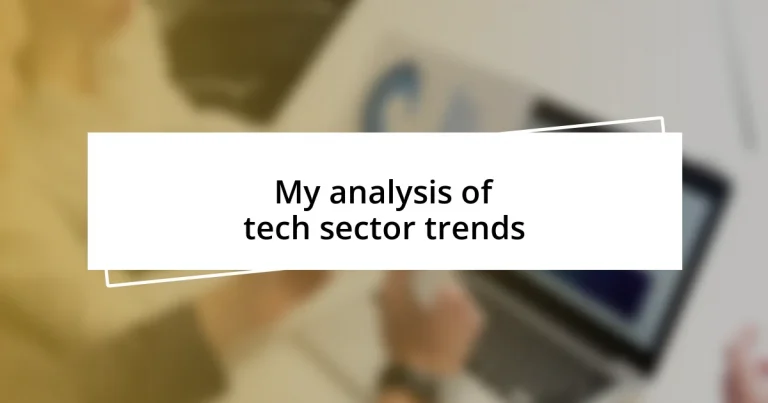Key takeaways:
- Artificial intelligence is revolutionizing businesses by enhancing customer service through chatbots and improving data analysis for informed decision-making.
- The rise of remote work technology has transformed collaboration and productivity, with tools like video conferencing fostering community despite physical distance.
- Investments in green technology and innovations in cybersecurity are essential, reflecting a commitment to sustainability and protecting data in an increasingly digital landscape.
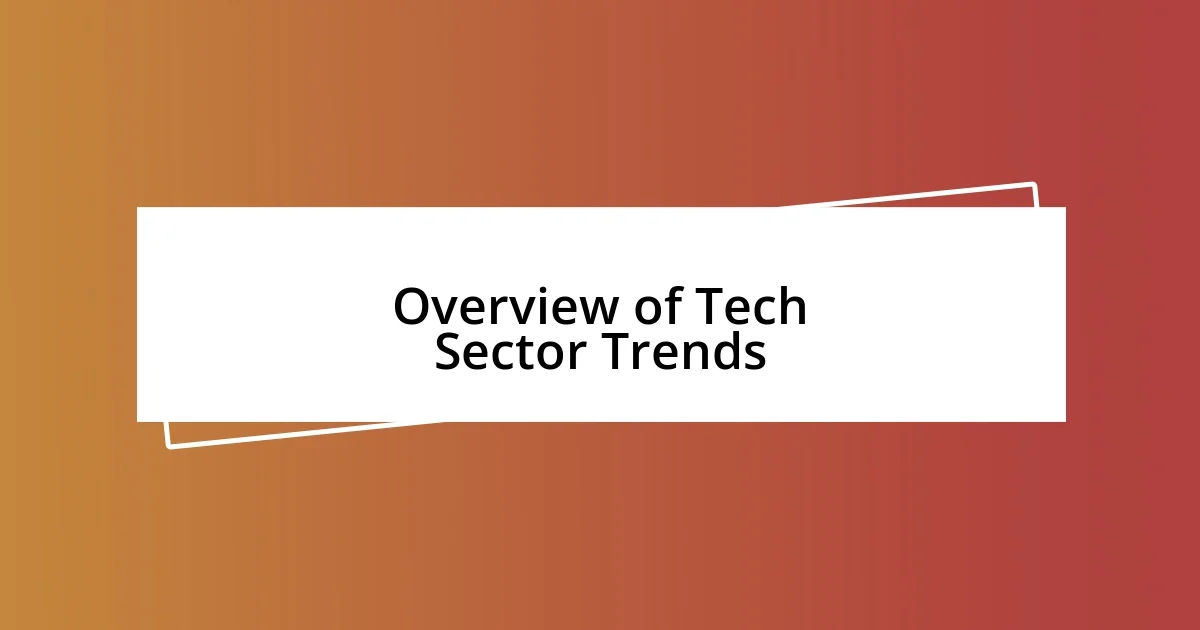
Overview of Tech Sector Trends
The tech sector is evolving at lightning speed, and it’s fascinating to witness how trends emerge and reshape our daily lives. For instance, I often reflect on the rise of artificial intelligence – it’s not just a buzzword anymore. Remember when voice assistants seemed like a novelty? Now, they’re integrated into our routines, making tasks more efficient. Doesn’t it feel like we’re living in the future?
Sustainability is another critical trend gaining traction within the tech landscape. I recently attended a conference where bright minds shared innovative ways to reduce e-waste. It made me think about my own tech habits; am I doing enough to recycle old gadgets? This trend isn’t just about technology; it’s a call for each of us to reconsider our impact on the planet.
Finally, the remote work culture has accentuated the demand for digital communication tools. I can still recall my first Zoom meeting during lockdown – it was a mix of confusion and hope. Now, the evolution of remote work technologies highlights resilience and adaptability. Are we ready to embrace this shift as the new norm, or do we cling to the comfort of traditional office settings?
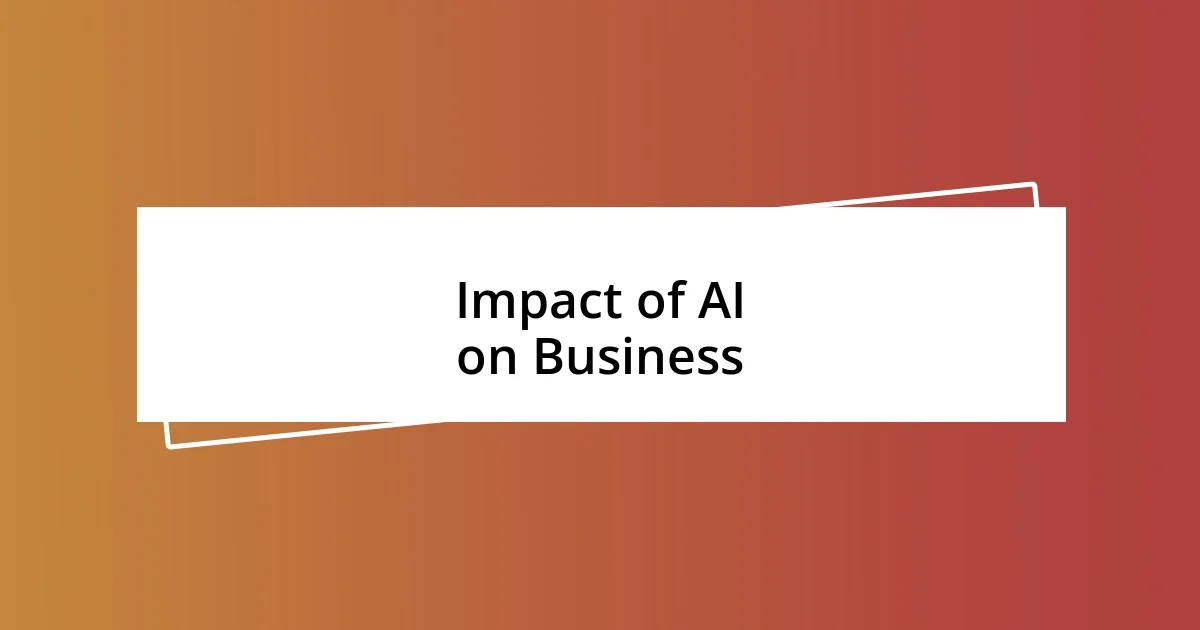
Impact of AI on Business
Artificial intelligence is transforming businesses in ways I never imagined. For example, when I first encountered AI-powered chatbots, I was skeptical. Could these tools really enhance customer service? However, after witnessing a chatbot handle customer inquiries seamlessly, I realized that not only can AI improve response times, but it also frees up human agents to focus on more complex issues. Isn’t it remarkable how technology can take mundane tasks off our hands, allowing for better productivity?
Moreover, AI’s impact on data analysis cannot be overstated. Recently, I had the opportunity to attend a workshop where a company shared its success story using AI algorithms to predict market trends. The way they harnessed data for strategic decision-making was inspiring. It made me think about my own data practices; have I been using all available resources to their full potential? The precision of AI allows businesses to identify patterns and make informed choices faster than ever before, changing the game in many industries.
The integration of AI is not without its challenges, though. While it’s exciting to see automation rise, I often reflect on the human aspect of these technologies. For instance, during a discussion with friends in the tech field, we contemplated the potential job displacement AI might cause. Are we preparing our workforce for this shift? As we embrace AI, we must also prioritize upskilling our teams, creating a balance between innovation and the value of human creativity.
| Aspect | Impact of AI on Business |
|---|---|
| Customer Service | AI chatbots enhance efficiency and free up human agents |
| Data Analysis | AI enables more accurate predictions and informed decision-making |
| Workforce Implications | Potential job displacement calls for upskilling and adaptation |
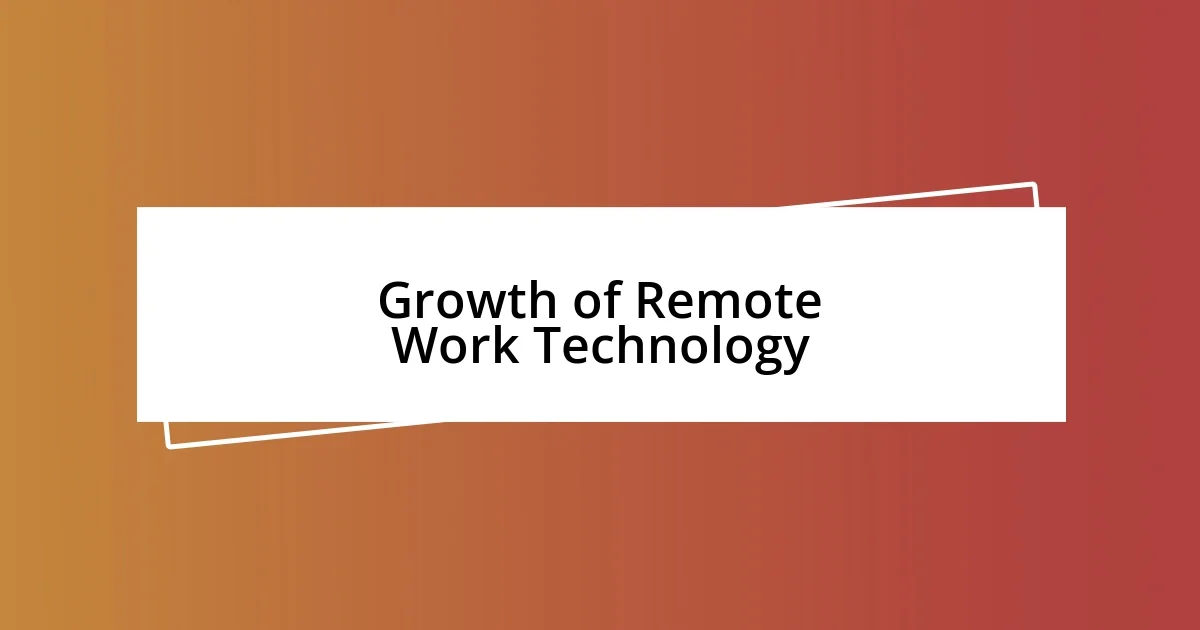
Growth of Remote Work Technology
The growth of remote work technology has truly transformed how we connect and collaborate. I remember the days of in-person meetings and the rhythm of office life, but now, I relish the flexibility of working from anywhere. Video conferencing platforms have bloomed, enabling not just work discussions but also virtual coffee breaks. These technologies foster a sense of community, even when we’re miles apart.
- Increased adoption of tools like Zoom and Microsoft Teams for seamless communication.
- Surge in project management software, allowing teams to collaborate in real-time.
- Remote work solutions enhancing productivity and work-life balance for many.
- Emergence of virtual reality for immersive meetings and training experiences.
In navigating this sea of digital tools, I often find myself experimenting with new apps to boost my workflow. Just recently, I tried a new collaborative platform that integrated project tracking and communication. It made me feel part of a team again, despite being physically distant. The emotional connection still matters, even through a screen, doesn’t it? As these technologies continue to evolve, I see an exciting frontier for remote work, one that blends efficiency with that cherished human connection we all crave.
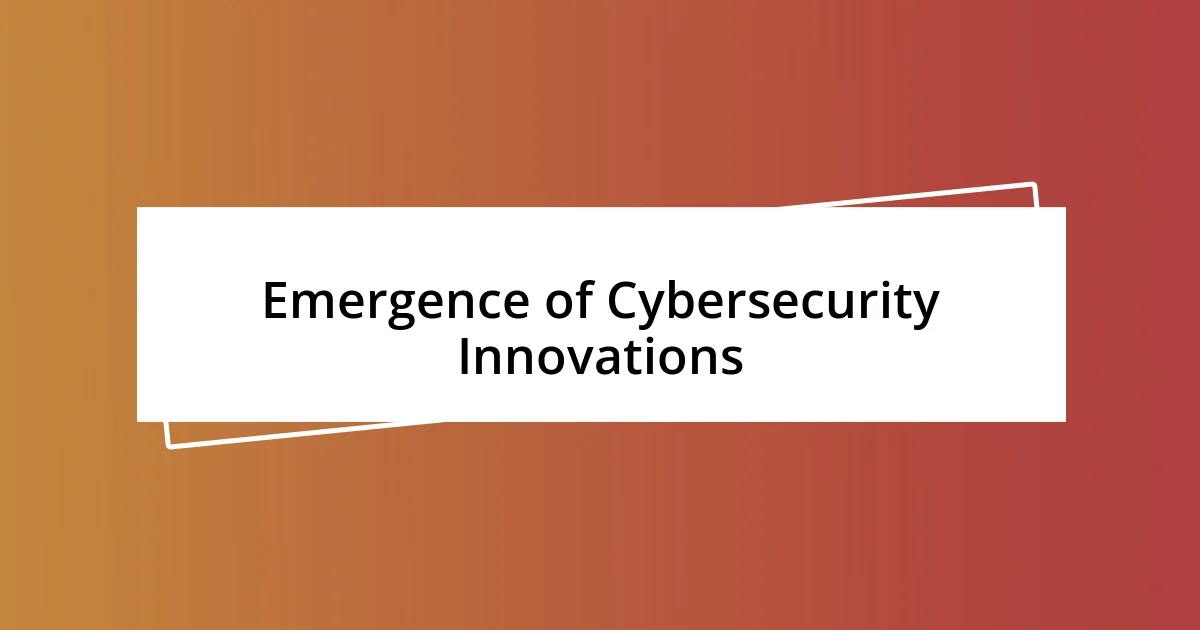
Emergence of Cybersecurity Innovations
The demand for cybersecurity innovations has skyrocketed, especially given the increasing frequency and sophistication of cyber threats. I recall attending a tech expo where a startup showcased a fascinating venture into adaptive security technology, which adjusts in real-time to identify and mitigate potential breaches. Isn’t it incredible how our defenses have evolved to be not just reactive, but proactively intelligent?
One innovation that caught my attention is zero-trust architecture. The concept, which essentially assumes that threats could be internal or external, resonated with me deeply. I remember my own experience with IT security in a previous role, where we had to constantly update our assumptions about potential vulnerabilities. I often think, how much stronger could our systems become if we embraced this approach wholeheartedly? Adopting this mindset could revolutionize how organizations protect their valuable data.
Additionally, the rise of AI in cybersecurity is another trend I find compelling. Machine learning algorithms can analyze massive datasets to identify unusual patterns that signal a threat. I found it fascinating when a cybersecurity firm shared that they managed to thwart attacks in real time, thanks to their AI-driven solutions. This made me reflect on my own reliance on technology for protection—doesn’t it feel reassuring to know that innovation is working tirelessly behind the scenes? As we continue to navigate this digital landscape, I believe investing in these advancements is not just smart; it’s essential for safeguarding our future.

Investments in Green Technology
The surge in investments in green technology reflects a growing awareness of our environmental responsibilities. I recently took part in a sustainability workshop, where the focus was on renewable energy solutions. One of the speakers shared their journey in developing solar technology that significantly increased efficiency. It made me realize the profound impact that innovation can have not just on cost savings, but on our planet’s health.
I find it fascinating how big corporations are stepping up to invest in sustainable practices. A friend of mine works at a tech company that switched to a completely eco-friendly data center strategy. The result? A staggering reduction in their carbon footprint and, surprisingly, a boost in employee morale. It’s a perfect illustration of how green investments not only pay off environmentally but also create a positive company culture. Doesn’t it encourage us all to think about what we can do individually and as businesses for a greener future?
Moreover, the rise in electric vehicles has been a game changer for the tech landscape. I remember test-driving an electric car last summer and being astonished by its quiet efficiency. As I learned more about battery technology advancements, I started to see these investments as a cornerstone for our future mobility. With so much potential in green tech, I can’t help but wonder: how many breakthroughs are still waiting to be discovered? This burgeoning field offers opportunities that blend sustainability with technological advancement, and I truly believe we’re just scratching the surface.
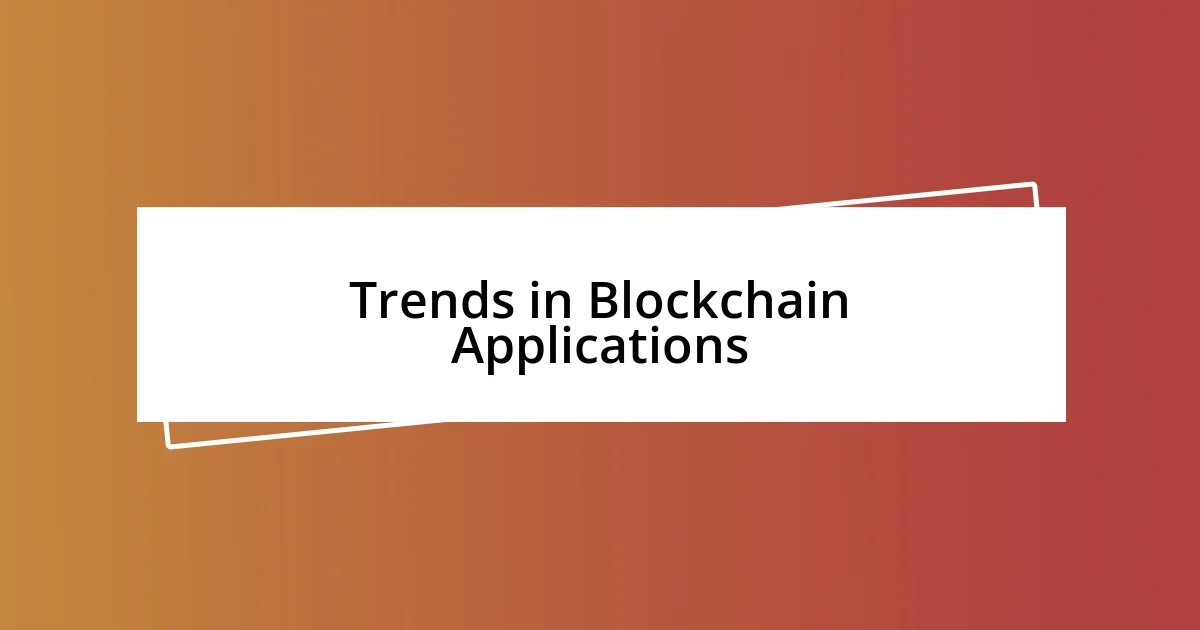
Trends in Blockchain Applications

Trends in Blockchain Applications
The versatility of blockchain technology is truly impressive; it’s not just about cryptocurrencies anymore. I recall attending a workshop where a speaker described how blockchain is being utilized for supply chain transparency. It hit home for me when they explained how consumers can now trace the origin of their goods—think about how empowering that is! Don’t you find it fascinating that we can witness the journey of our products from farm to table? This transparency fosters trust, which is crucial in today’s market.
One application that excites me is in the realm of smart contracts. While they might sound a bit futuristic, I can assure you they’re already making waves. I was reading about a real estate transaction where a smart contract simplified the process, eliminating the need for multiple intermediaries. Imagine the time and money saved! It makes me ponder—how often do we find ourselves frustrated by bureaucratic delays that could be avoided? As more industries adopt this technology, I believe we’ll see a seismic shift in how agreements are managed and executed.
Moreover, the rise of decentralized finance (DeFi) applications is a trend I can’t ignore. I find it thrilling to think that traditional banking barriers are being dismantled, allowing individuals greater financial freedom. My experience with DeFi platforms, where I could earn interest on my crypto holdings, was eye-opening. Isn’t it liberating to imagine a world where access to finance isn’t a privilege but a basic right? The potential to reshape financial systems globally gives me hope; we’re stepping into a new era where everyone can participate in economic growth.
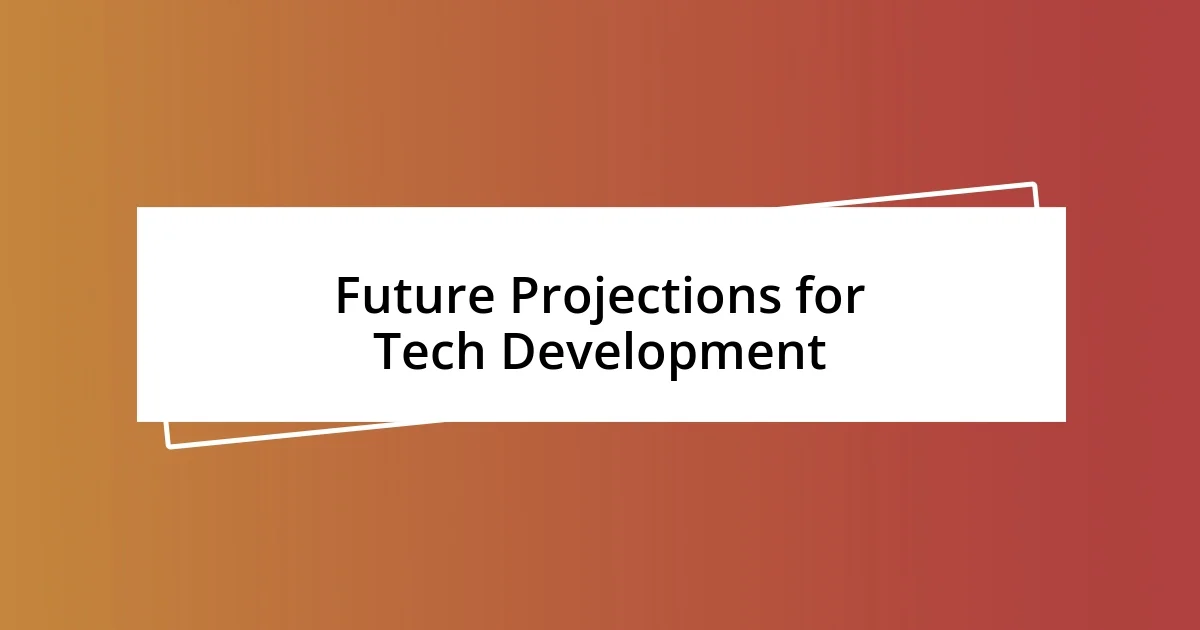
Future Projections for Tech Development
I see the future of tech development being shaped profoundly by artificial intelligence. Just the other day, I was experimenting with a new AI tool that analyzes data patterns in real-time. The speed and accuracy were astonishing, making me wonder: how can AI further enhance our daily lives? As more businesses recognize AI’s potential, I believe it’s going to become an indispensable ally in decision-making processes across various sectors.
Moreover, the integration of augmented reality (AR) into everyday applications is on the horizon. I recently attended an AR demonstration that allowed users to visualize furniture in their homes before making a purchase. The experience was immersive and practical, sparking ideas about how AR could revolutionize everything from education to remote work. What if we could step into our future before it exists? This kind of tech not only captivates the imagination but also possesses the ability to transform experiences.
Finally, the evolution of cybersecurity will play a critical role in safeguarding all these advancements. My awareness of digital security intensified after reading a harrowing article about a data breach affecting millions. It dawned on me just how essential it is for tech development to keep pace with these threats. With the proliferation of IoT devices and smart tech, I worry—how will we ensure our safety in an increasingly connected world? Addressing these concerns will shape the reliability of future innovations, allowing users to fully trust and embrace new technologies.












